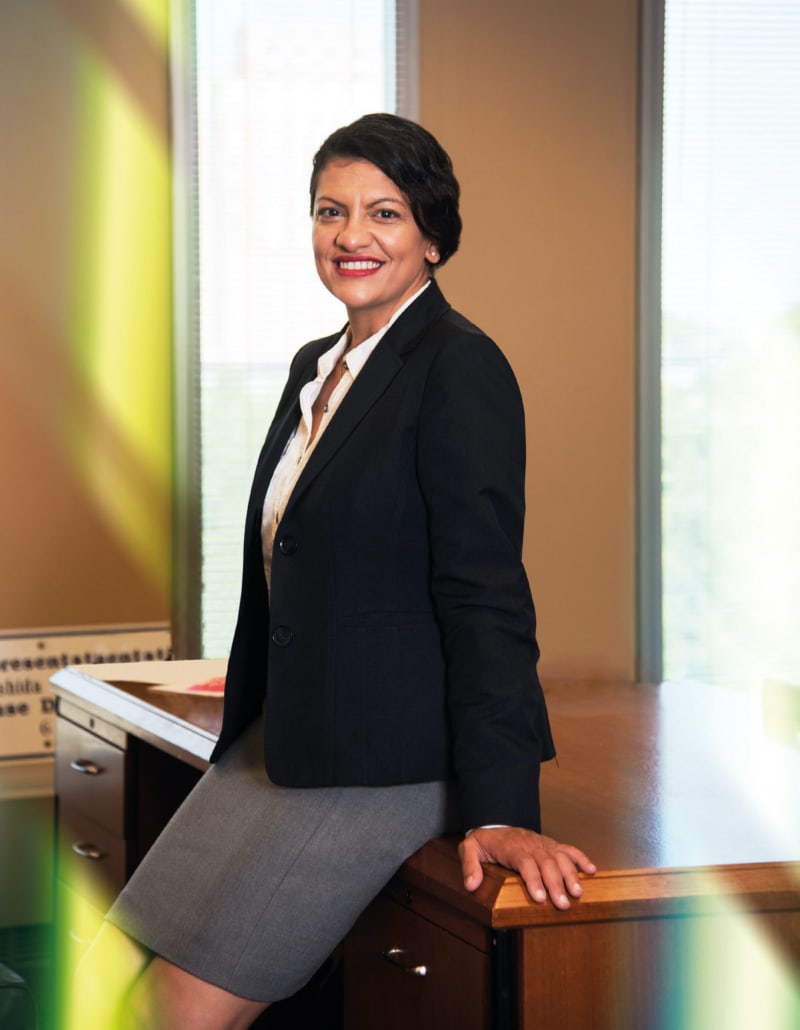Born To Serve: Rashida Tlaib
Vogue Arabia, 2020
As she gears up to run for a second term, American-Palestinian US Member of Congress Rashida Tlaib reinforces that her strength comes from the streets.

Rashida Tlaib photographed by Cydni Elledge for Vogue Arabia September 2020
American-Palestinian politician and lawyer Rashida Tlaib is a born leader, but not in the cliched sense of the term. The US Representative – elected for Michigan’s 13th congressional district last year – is also the eldest of 14 siblings. Growing up in Detroit, Tlaib has long protected, nurtured, and advocated for the people around her. A member of the Democratic Socialists of America party, Tlaib made history as one of the first Muslim women in US Congress when she won her seat, along with Ilhan Omar, the Representative for Minnesota. She believes her successes are the result of her lifelong responsibilities as a devoted sister, daughter, mother, and neighbor.
“Most of my experience has been about fighting somebody on behalf of my family or a friend, speaking up, and not staying silent,” she says. Tlaib grew up in a predominantly Black neighborhood in Detroit where each corner of the city tells of a turning point in US history. The same streets through which demands for social justice flowed during the civil rights movement in the 60s first vibrated with victory for the United Auto Workers union after a series strikes in the 30s. Those streets came alive once again with cries for equality this past June as Tlaib and her neighbors joined protests following the killing of George Floyd during an arrest. Floyd’s death and final words, “I can’t breathe,” triggered shock and outrage across the globe, but they’re all too familiar among Tlaib’s constituents. The congresswoman lets it be known that she represents America’s third-poorest district, where residents feel suffocated not only by societal structures allowing for systemic racism to thrive, but by a lack of clean air and water due to corporate polluters operating in their backyards. Considering the subsequent respiratory conditions residents suffer, it’s not surprising that when Covid-19 struck, it hit Michigan’s exposed communities the hardest. Decidedly, wherever the government falls short, Tlaib aims to step in.

The Congresswoman speaking with a Detroit resident. Photo: Supplied
“Even when the pandemic happened, we didn’t wait for the government, we were already showing up for each other. We knew when we were showing up for our neighbors, we were going to save lives,” Tlaib says. Citing the late social activist Grace Lee Boggs, she describes the collective activism that has swept the nation as reinforcing why she ran for public office in the first place, and why she’s gunning for an even more impactful second term. “Boggs used to say that transformative change doesn’t happen in the halls of Congress or because of who’s in the White House. It happens in the streets when we demand it,” Tlaib shares. “She called it when the people’s consciousness rises. That’s what I’m seeing now, and it’s inspiring.”
Tlaib’s ambition has always been anchored in the spirit of community. She is the daughter of Palestinian immigrants with relatives still living in the West Bank villages of Beit Ur al-Fauqa and Beit Hanina. While her father worked on an assembly line in a Ford Motor Company plant, Tlaib assumed the role of family translator until the age of 12. As soon as she started to see herself through the lens of otherness so often used to scrutinize non-white Americans, Tlaib found her voice by confronting judgment in defense of her loved ones. It’s the same voice that echoes throughout the chambers of Congress today as she amplifies the need for change on behalf of the marginalized groups she represents. This mission, Tlaib asserts, is guided by both her faith and empathy. She recalls an exchange with an impatient cashier who lashed out at her mother’s strained attempt to communicate – “Can’t she just learn English?” the woman shouted at a pre-teen Tlaib – as one example of countless discriminatory behaviors.
I became a better Muslim growing up in a beautiful Black city
“I became a better Muslim growing up in a beautiful Black city like Detroit because justice became second nature and to me, Islam is so much about that,” she says. “I’ve been taught that Allah’s going to give you three or four times back in rewards if you take care of your community.” Channeling her mother’s compassion and her grandmother’s ferocity (her Sity Shama’s name may mean candle in Arabic, but Tlaib remembers her as more of a fireball), Tlaib exploded onto the political scene with the purpose of yanking back the congressional cloak of invisibility keeping America’s ignored and underserved in the shadows. The act of getting sworn in on Thomas Jefferson’s Qur’an while wearing a Palestinian thobe affirmed the existence of women like Tlaib in the eyes of the American public and signaled to the world that she was entering this governing body as the truest and most unapologetic version of herself: a Muslim woman with the will to subvert the status quo. She’s even found a microcommunity in Congress, her “sisters in service,” who are as passionate about dismantling hate. Tlaib is a member of “The Squad,” alongside Alexandria Ocasio-Cortez, Ayanna Pressley, and Ilhan Omar. The four are all women of color under the age of 50, elected at the same time and with the same liberal values, said to represent the diversity of the younger political generation. She is also being mentored by Californian politician Barbara Lee, who’s been in Congress since 1998.